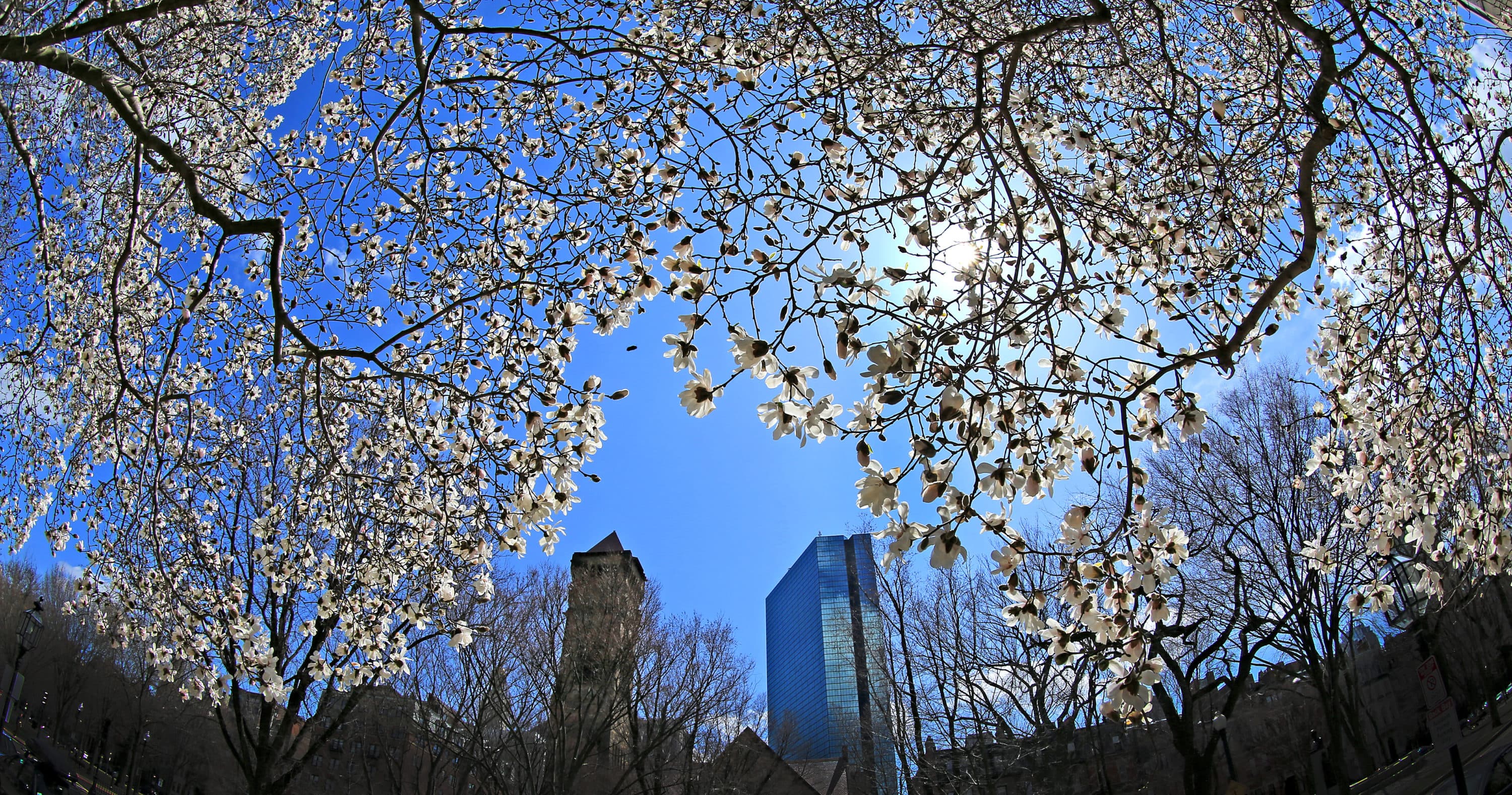Advertisement
It's the time of year New England allergy sufferers dread. Here are tips to help you prepare for spring

Sneezing. Scratchy eyes. Car windshields caked with yellow-green buildup.
These are the signs of spring that New England allergy sufferers (including this reporter) greet with disdain. Despite heralding the triumphant return of our local plant life, these gifts feel more like lumps of coal.
We're early in the pollen season here in the Northeast, with most trees still as bare as they've been for months. But there's actually tree pollen already flying through the air here in Massachusetts — courtesy of the Mid-Atlantic and South. That's according to Dr. Frederic Little, an allergy specialist at Boston Medical Center who also runs the allergy fellowship training program at Boston University School of Medicine.
While it's a little too soon to meaningfully track pollen counts in Massachusetts, he points to warmer-weather states like Georgia, Virginia and North Carolina, where the tree pollen season (the main culprit for most springtime allergies) is underway. As trees in those places pop, they release microscopic pollen that then catches a ride to the Northeast via the jet stream.
"Allergy sufferers who are allergic to trees will sometimes be confused, because our trees are still bare here in the New England area — there may be some snow on the ground even — and they're starting to have allergy symptoms," Little said, adding those symptoms are indeed kicking in for some in our area.
Things will unfortunately only get worse from here as we approach peak tree pollen between the end of April and late May. With that in mind, we asked Little for tips to cope with the season:
Go on the defensive: Limiting pollen indoors
Despite the COVID-19 pandemic's best efforts, people go outside. But with tree pollen flying around basically everywhere — even in urban areas that tend to have fewer trees — coming into contact with pollen is inevitable, too.
Anytime you set foot outdoors, "there are going to be tree pollens that will be getting onto your clothes and you'll be bringing those pollens in the house," Little said.
There are common-sense steps you can take to protect yourself, Little said — beyond simply limiting time outside right when warmer weather returns.
The first is probably a given, but it helps to keep your windows closed as much as possible. You could also wash your face after you get home from being out and about. And for even more assurance, you could change your clothes in a separate room when you come back inside, and designate "indoor clothes" versus "outdoor clothes," Little said.
Air conditioners can also help ward off pesky pollen.
"They tend to dehumidify the air a little bit," Little said. "Sometimes heavy humidity can be more of a problem for people that have severe allergies, and also people that have associated lung diseases like asthma or [chronic obstructive pulmonary disease], where humid, heavy air can add further discomfort."
A/C helps not only dehumidify the air but also filter it, Little said — however you'll want to change or at least regularly clean those components. (And make sure to use an energy-efficient model!)
Another use for that stash of masks?
Speaking of filtration, Little said some of his allergy patients reported the pandemic brought them an added springtime benefit: protection with a mask.
"It turns out that people last year, when masks were very pervasive, found that their allergies were a little bit less [severe] — even if they weren't high-grade, industrial and KN95 masks," Little said. "Even people with surgical masks sometimes felt as though there was a little bit of filtering."
While he said it's true a mask may offer at least some extra shielding against airborne pollen, Little said he doesn't recommend masking outdoors solely for allergies.
The line between allergies and COVID
As an allergy clinician who has also treated COVID patients in Boston Medical Center's intensive care unit, Little said he's become accustomed to questions — even from friends and acquaintances — about whether allergy-like symptoms spell something more severe.
"I can assure you that there have been thousands — or hundreds of thousands — of home antigen tests for COVID that have been burned through with people who wake up in the morning with a scratchy throat, a little bit of a runny nose, and have this question, 'Oh, my goodness, is this it?' " Little said.
Despite some overlap, Little said there are specific signs you can monitor to hopefully stop yourself from spiraling.
"It's pretty uncommon to have a fever with the onset of allergy symptoms during the season," he said. "And also, some people with COVID will tend to have a lot more fatigue. Allergy sufferers can have some fatigue. But if people really feel completely run-down, even if they're not super sick, that would suggest that reaching for that home COVID test might be the right idea."
The CDC adds body aches and loss of taste or smell aren't usually linked to allergies either.
When in doubt, it may be worth a test for added peace of mind, Little said. Because the last thing we want to do is jeopardize each other's health and safety — or elevate our own stress levels. (You can order free rapid tests from the U.S. government as long as your household hasn't already received its allotted eight kits.)
Allergies in a warming world
Big picture, we know that climate change will bring widespread environmental change to the Northeast, from coastal flooding to tick activity. Allergy season is unfortunately another item on that list.
Recent studies build the case that rising temperatures will cause tree pollen seasons that start earlier and last longer. And not only that, they will be more intense, Little said.
"The total pollen counts, in terms of the density of pollen that is released over the course of the season, will go up," he said. "Higher carbon-dioxide concentrations lead to more plant growth, and more plant growth means more vigorous plants — and what plants like to do is to reproduce by releasing pollen and expanding."
Efforts to limit greenhouse gas emissions will be crucial for the future of New England's allergy seasons, Little said. (Here are some tips if you're looking to fight climate change closer to home.)
For now, it may be as good a time as any to stock up on tissues and eye drops.
